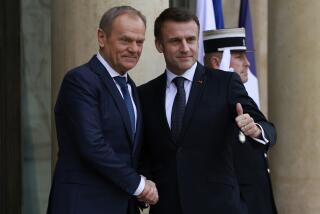Reagan Seeking Allied Support on ‘Star Wars’ : Diplomats Say U.S. Is Willing to Share Research in return for Pledge at Bonn Economic Summit
PARIS — The Reagan Administration is pressing its major allies for a joint declaration of support for its Strategic Defense Initiative when seven heads of government gather in Bonn for their annual economic summit meeting May 2-4, according to European diplomats involved in summit preparations.
They said that the Administration desires such a declaration to put further pressure on the Soviet Union to get down to “meaningful negotiations” at the resumed nuclear arm talks in Geneva. The economic summit calls together the leaders of the United States, Britain, France, West Germany, Italy, Canada and Japan.
In return for such support, these diplomats say, the United States is ready to pledge a policy of cooperation and access to the high technology that is involved in the multi-billion-dollar program of research into the space-based defense system, nicknamed “Star Wars.”
French Reluctant
However, there is a marked reluctance, particularly by the French, to get involved in such a joint policy declaration. Before making any response to Washington, the Europeans plan to coordinate their own views at a meeting of foreign and defense ministers of the seven-nation Western European Union, scheduled for April 22-23 in Bonn. Union members are France, Britain, West Germany, Italy, the Netherlands, Belgium and Luxembourg.
Space-based defense will also be discussed at Tuesday and Wednesday’s meeting of defense ministers from 13 North Atlantic Treaty Organization member nations in Luxembourg.
So far, Reagan has gotten qualified public statements of support for “Star Wars” research from Prime Ministers Margaret Thatcher of Britain and Bettino Craxi of Italy and Chancellor Helmut Kohl of West Germany after each of their recent visits to Washington.
The French have voiced murmurings of support, in effect simply acknowledging that it is prudent to undertake research in the space defense field.
All of the Europeans have emphasized that their support for the program does not extend to any actual deployment.
Also, since renewed U.S.-Soviet arms control talks opened in Geneva two weeks ago, British Foreign Secretary Geoffrey Howe and West German Foreign Minister Hans-Dietrich Genscher both have made public declarations heavy with reservations about the feasibility and strategic wisdom of the space-based defense program.
Howe, in a speech in London before the Royal United Services Institute for Defense Studies, said that “it would be a serious blunder if the West allowed the Russians to enjoy their present monopoly” in any satellite and space weaponry, but he then added:
“It would be wrong to underestimate the enormous technological expertise and potential of the United States, but as we all recognize, there would be no advantage in creating a new Maginot Line of the 21st Century, liable to be outflanked by relatively simple and demonstratively cheaper countermeasures.”
The Maginot Line was a series of supposedly impregnable fortifications in France that invading German forces in World War II simply went around.
Meanwhile, West Germany’s Kohl, in a speech last week to a party congress of the Christian Democrats, said that “we are leaving our decision one way or another on implementation of the Strategic Defense Initiative, and we will continue to seek a common European position and to explain this to our American allies.”
A senior French diplomat said he sees the space-based defense program as reducing, not enhancing, the chances of an agreement on cutbacks in offensive weapons. He said the Soviet Union is unlikely to be ready to curtail its offensive capacity when the United States is doing research on a new defensive system.
The Japanese position on a possible joint declaration of support for the United States has not been disclosed, but diplomatic sources here say that Japan’s interest in keeping a door open to technological sharing with the United States will probably be more important than any political reluctance to follow the Reagan Administration’s wishes.
Whether the Europeans will fashion a joint position and whether it would be what Washington would like appears to be an open question at present, the diplomats say. The U.S. allies will be reluctant to openly split with the United States on this issue, they add, but whatever language emerges in support of the U.S. program is likely to be carefully hedged.
More to Read
Sign up for Essential California
The most important California stories and recommendations in your inbox every morning.
You may occasionally receive promotional content from the Los Angeles Times.










